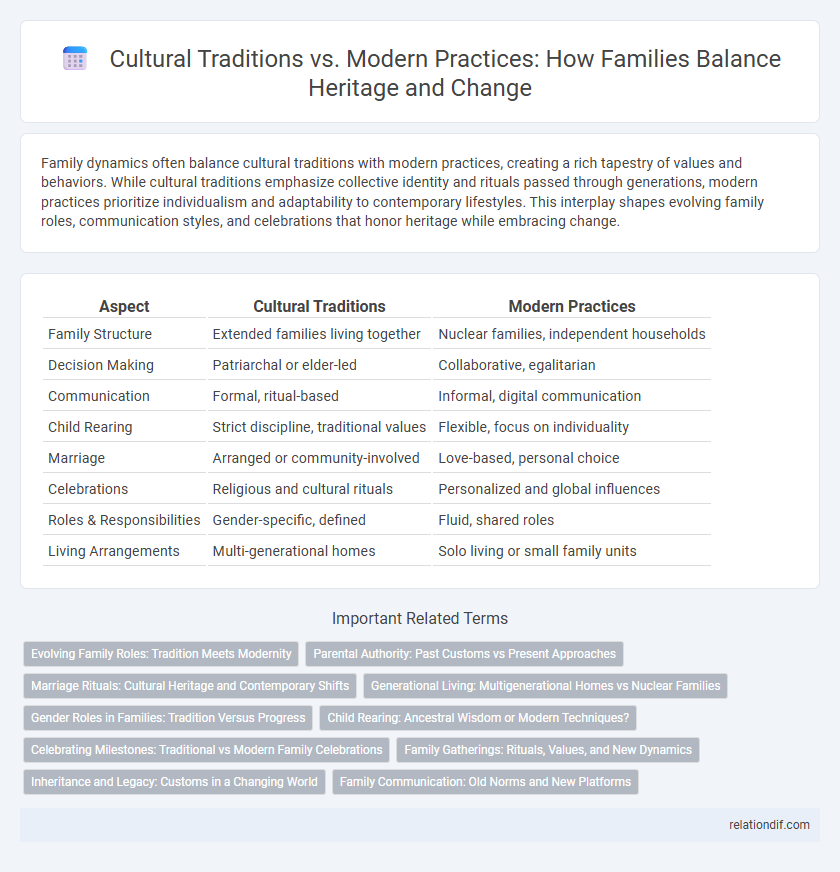Family dynamics often balance cultural traditions with modern practices, creating a rich tapestry of values and behaviors. While cultural traditions emphasize collective identity and rituals passed through generations, modern practices prioritize individualism and adaptability to contemporary lifestyles. This interplay shapes evolving family roles, communication styles, and celebrations that honor heritage while embracing change.
Table of Comparison
| Aspect | Cultural Traditions | Modern Practices |
|---|---|---|
| Family Structure | Extended families living together | Nuclear families, independent households |
| Decision Making | Patriarchal or elder-led | Collaborative, egalitarian |
| Communication | Formal, ritual-based | Informal, digital communication |
| Child Rearing | Strict discipline, traditional values | Flexible, focus on individuality |
| Marriage | Arranged or community-involved | Love-based, personal choice |
| Celebrations | Religious and cultural rituals | Personalized and global influences |
| Roles & Responsibilities | Gender-specific, defined | Fluid, shared roles |
| Living Arrangements | Multi-generational homes | Solo living or small family units |
Evolving Family Roles: Tradition Meets Modernity
Evolving family roles reflect a dynamic balance between cultural traditions and modern practices, with many households integrating age-old values such as respect for elders alongside contemporary views on gender equality and shared responsibilities. This fusion influences caregiving patterns, decision-making, and communication styles within families, promoting adaptability while preserving cultural identity. Studies show that families combining traditional and modern roles often experience enhanced emotional support and resilience in facing social changes.
Parental Authority: Past Customs vs Present Approaches
Parental authority has traditionally been defined by strict adherence to cultural customs that emphasize respect, obedience, and hierarchical family roles. Modern practices, however, prioritize open communication, emotional support, and collaborative decision-making between parents and children. This shift reflects broader societal changes toward individual autonomy and egalitarian family dynamics.
Marriage Rituals: Cultural Heritage and Contemporary Shifts
Marriage rituals embody rich cultural heritage, preserving symbolic customs such as arranged ceremonies, traditional attire, and ritualistic blessings that emphasize familial bonds and community involvement. Contemporary shifts often feature personalized vows, destination weddings, and eco-friendly celebrations, reflecting changing values towards individuality and sustainability. Balancing these elements highlights the evolving nature of marriage as families navigate honoring tradition while embracing modern expressions of commitment.
Generational Living: Multigenerational Homes vs Nuclear Families
Multigenerational homes preserve cultural traditions by fostering daily interactions among grandparents, parents, and children, promoting shared values and collective support systems. In contrast, nuclear families emphasize independence and privacy, reflecting modern practices that prioritize self-sufficiency and individualized lifestyles. Studies show that multigenerational living enhances emotional well-being but may face challenges related to space and autonomy.
Gender Roles in Families: Tradition Versus Progress
Traditional gender roles in families often assign caregiving and domestic duties primarily to women, while men are viewed as financial providers and decision-makers. Modern practices challenge these conventions by promoting gender equality, encouraging shared responsibilities, and supporting diverse family structures. Research shows that flexible gender roles contribute to healthier family dynamics and improved emotional well-being for all members.
Child Rearing: Ancestral Wisdom or Modern Techniques?
Child rearing practices vary widely between ancestral wisdom and modern techniques, with traditional methods emphasizing communal upbringing, oral storytelling, and strict discipline to instill values. Modern approaches prioritize developmental psychology, individualized learning, and emotional intelligence to foster autonomy and creativity. Balancing cultural traditions with evidence-based strategies can enhance child development while preserving family heritage.
Celebrating Milestones: Traditional vs Modern Family Celebrations
Traditional family celebrations often emphasize cultural rituals, such as religious ceremonies and heritage-specific customs, to mark milestones like births, weddings, and anniversaries. Modern family celebrations increasingly incorporate personalized experiences, including destination parties, social media sharing, and non-traditional gift exchanges, reflecting diverse values and lifestyles. Combining these approaches allows families to honor their roots while embracing contemporary expressions of joy and connection.
Family Gatherings: Rituals, Values, and New Dynamics
Family gatherings preserve cultural traditions through rituals that reinforce shared values such as respect, unity, and heritage. Modern practices introduce new dynamics, including virtual reunions and flexible scheduling, which enhance accessibility and adapt to diverse lifestyles. Balancing these elements ensures that family connections remain strong while evolving with contemporary needs.
Inheritance and Legacy: Customs in a Changing World
Inheritance customs vary significantly across cultures, reflecting deep-rooted values and societal structures that emphasize family legacy and property distribution. Modern practices, influenced by legal frameworks and globalization, often challenge traditional norms by promoting equitable division and individual autonomy over ancestral assets. This evolving dynamic reshapes family legacies, balancing respect for cultural heritage with contemporary ideals of fairness and personal choice.
Family Communication: Old Norms and New Platforms
Family communication has evolved from traditional face-to-face interactions and handwritten letters to diverse digital platforms like video calls, instant messaging, and social media. Cultural traditions emphasize respect, formality, and hierarchical roles within family discussions, while modern practices promote openness, immediacy, and informal exchanges across generations. The fusion of these communication methods shapes how families maintain emotional bonds, resolve conflicts, and share experiences in today's interconnected world.
cultural traditions vs modern practices Infographic

 relationdif.com
relationdif.com